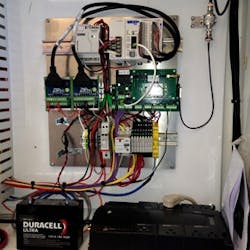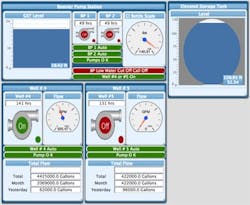Custom Reliability
The City of White Deer, Texas, is located in North Texas and serves approximately 500 water taps. The water distribution operation includes a flow-pacing chlorine injection valve. For ten years, the utility had a custom-programmed, radio-based SCADA system in place, and it worked while meeting the needs of the operators. After several years, the radio communications became unreliable and the system experienced several connection dropouts. The system relied on constant connectivity to ensure functional controls and proper chlorine injection rates.
On the rare occasion that the SCADA system sent alarm notifications, the utility operators were required to drive out to one of the sites where the local human machine interface screen was accessible to determine what triggered an alarm. Once onsite, the operator would determine what tools or personnel were needed to correct the problem.
The Solution
Due to a history of unreliable SCADA service and increased labor service hours, the City of White Deer went through the process of seeking alternative technologies to address its needs. One of the key functional requirements of this search was that the SCADA vendor would be able to handle controlling the chlorine injection system that was in place so the utility did not have to completely replace the existing infrastructure. Upon examining the qualifications of several vendors from the radio and cellular market, the city determined that High Tide Technologies, a cloud-based SCADA system, would fit its needs as well as its project budget.
Key SCADA system requirements required a 4-20mA analog output signal used to pace the chlorine injection. The pump injection rate required a proportional input based on total flow rate from all the well pumps currently running. For example, if there are three well pumps, Well No. 1 is 100 gpm, Well No. 2 is 200 gpm and Well No. 3 is 300 gpm, the chlorine injection rate should be proportional to not only the number of wells running, but also the flow rate of each well pump. If Well No. 1 and Well No. 2 are running, the chemical injection should be paced for 300 gpm, but if Well No. 2 and Well No. 3 are running, it should be paced for 500 gpm.
At the time of purchase, these control conditions were not something that High Tide Technologies offered as a part of its standard system. However, within a three-day turnaround, the High Tide personnel configured the server controls module so that it could handle this process. No programming was required at the actual well sites or injection stations. After the server was configured, the system was tested in the field, and the City of White Deer's automated flow-pacing chlorine injection system was working in 15 minutes.
“The changeover was much easier than I expected, especially with us creating a brand-new control scheme for this customer,” said Bryan Hughes, an installer for Texas-based distributor Odessa Pumps, a DistributionNOW company. “High Tide Technologies handled this application flawlessly.”
Overall, the low cost, flexibility and speed to installation were all factors that made cloud-based SCADA the best fit for the City of White Deer. The ability of High Tide Technologies to configure a customized control scheme in just a few days at no extra charge was a bonus. With this solution, the city could keep their existing controls in place, and their water customers did not have to experience a service interruption. It was a smooth transition for everyone involved.
David Mundie, Ph.D., is president of High Tide Technologies.

